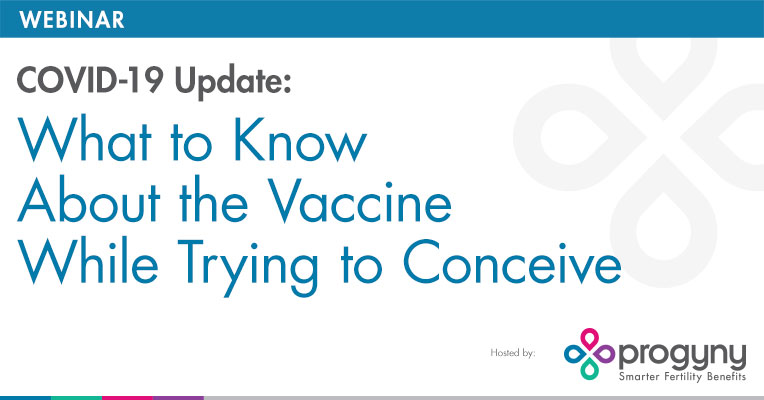Progyny is committed to ensuring all of our members are fully supported on their fertility and family building journeys, especially as we navigate the COVID-19 pandemic. That’s why we hosted a free 30-minute webinar to discuss what you need to know about the COVID-19 vaccine. Whether you are thinking about expanding your family, actively trying to conceive, or already pregnant, see the recap below to learn more about the vaccine.
Featuring
- Lissa Kline, LCSW, SVP Member & Provider Services, Progyny
- Alan B. Copperman, MD, Reproductive Endocrinologist, RMA New York and Medical Director, Progyny
We are now over one year on from the first cases of COVID-19 in the United States. Although stay-at-home orders initially halted fertility treatment, people soon realized it was essential medicine, and treatments resumed, albeit with new social distancing regulations in place. Since then, clinics have been operating at full capacity but with strict safety protocols, including increased telehealth use, rigorous cleaning of clinics, and new social distancing rules.
Progyny has been operating throughout, and our Patient Care Advocates have been providing dedicated emotional support. First and foremost, we are committed to the safety of our members. We have been working tirelessly to verify clinics are operating safely, and members have the knowledge to make informed decisions.
It is essential to continue to wear a mask and social distance, even as vaccines roll out. Until we reach a level of community immunity from vaccines and those that have recovered from the virus, social distancing and mask-wearing will save lives.
What to Know About the Vaccine While Trying to Conceive
Thanks to scientists’ hard work at home and abroad, we now have three FDA approved vaccines. With the implementation of vaccines, we hope the end of the pandemic is in sight. As with any medical decision, it’s imperative to talk to your doctor about whether the vaccine is right for you, as each person has their own medical history.
The vaccines are incredible tools to fight COVID-19. Most medical organizations are encouraging patients to take the vaccine, even if they are pregnant or looking to conceive. The American Society for Reproductive Medicine (ASRM) released a statement in January 2021 confirming that “the known and potential benefits of these vaccines outweigh the known and potential harms of COVID-19 infection.”
Although pregnant women weren’t included in vaccine trials, since the FDA approved the Pfizer-BioNTech and Moderna vaccines, over 75,000,000 doses have been administered, including pregnant women. So far, there have been 20,000 pregnant women vaccinated with no red flags, according to Anthony Fauci.
There is no data that any of the COVID-19 vaccines cause infertility. Experts recommend you still get a vaccine if you are looking to conceive if you are offered one.
The mRNA vaccine does not contain the live virus that causes COVID-19 so, it cannot give someone COVID-19. Because the mRNA does not enter the nucleus of cells, mRNA vaccines do not interact with a person’s DNA. Cells break down the mRNA quickly. Experts believe mRNA vaccines are unlikely to pose a specific risk for pregnant women or those looking to conceive.
There is less data on the Johnson and Johnson vaccine, which was approved last week.
Ultimately it is up to you and your doctor. Only you and your doctor know your medical history, so consult a healthcare professional before making a medical decision.
Pregnancy and Vaccine Side Effects
According to the CDC, observational data demonstrates that, while the chances for these severe health effects are low, pregnant people with COVID-19 have an increased risk of severe illness, including illness resulting in ICU admission, mechanical ventilation, and death with non-pregnant women of reproductive age. Pregnant people with COVID-19 might be at increased risk of adverse pregnancy outcomes, such as preterm birth, compared with pregnant women without COVID-19. Even a recent case report in Florida saw detectable levels of antibodies to SARS-COV-2 detected in the cord blood after maternal vaccination–which indicates that protection is potentially possible for babies of vaccinated mothers.
Some people have reported some mild symptoms from the vaccines. These include pain and swelling at the injection site, fever, chills, tiredness, and headache. If a patient has a fever after vaccination, they can take acetaminophen to reduce the fever. If you are pregnant and experiencing any side effects from the vaccine, please let your doctor know.
FAQs
Progyny is always here to support you on your family building journey. Please remember the best person to help you make vaccine-related decisions is your own physician. However, if you are a Progyny member, your Patient Care Advocate is always here for emotional support or fertility advice. Please don’t hesitate to reach out.
For more information about COVID-19, please visit our resources page.
If you enjoyed this webinar, please join us for our next webinar, Journey to Fatherhood: Finding Support in the Journey, on March 24. Register here today.
